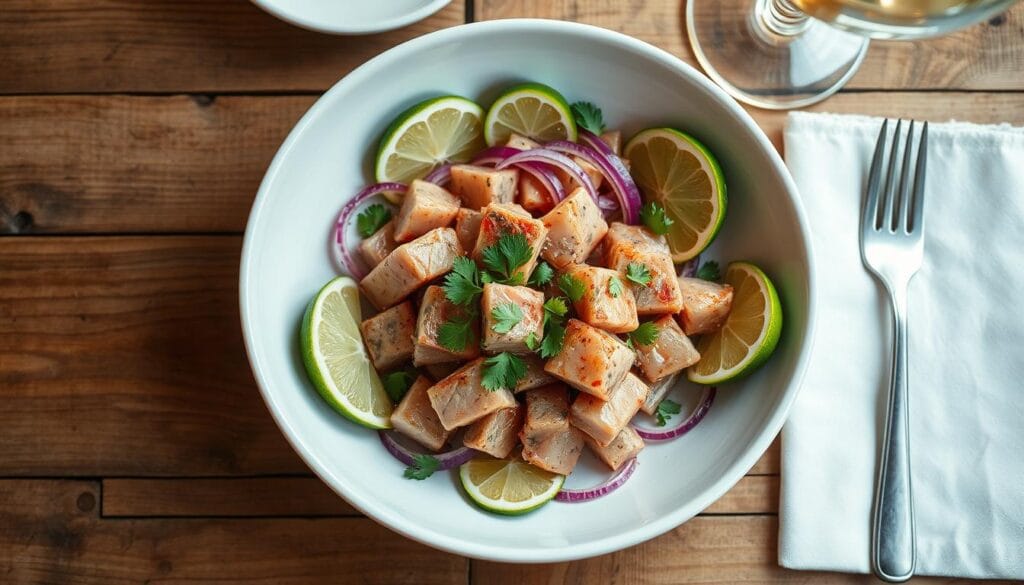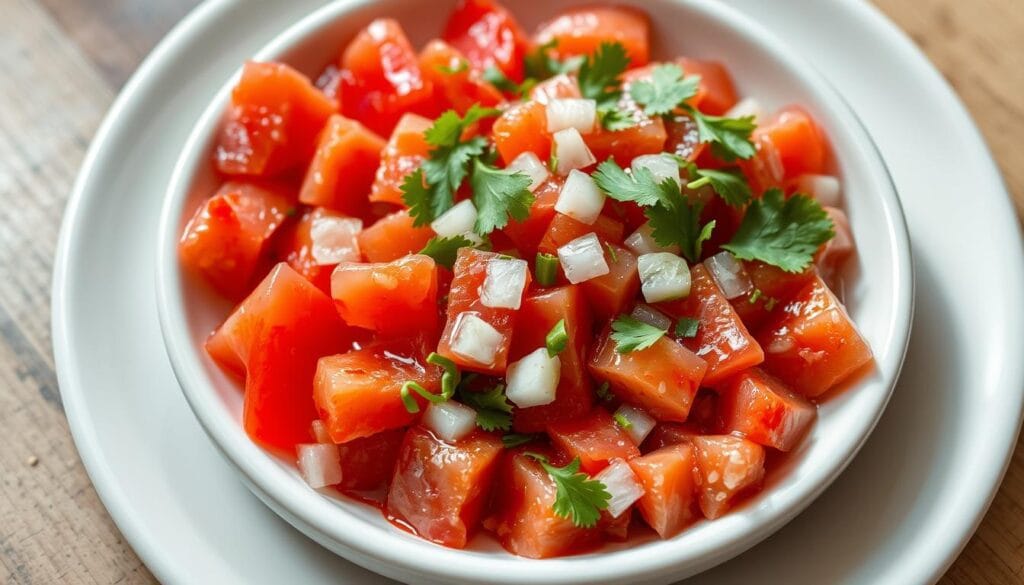Imagine the freshness of the ocean in a dish that’s both simple and sophisticated. Making fresh tuna ceviche at home is easier than you think. It’s a great way to impress your guests or enjoy a light, refreshing meal.
With just 20 minutes of prep time and an hour for the flavors to meld, you can have a delicious homemade tuna ceviche ready. It serves 6 people and takes only 1 hour and 20 minutes to prepare.
This article will guide you through making this delightful dish. You’ll get a simple tuna ceviche recipe and tips to make it your own.
Table of Contents
Understanding Tuna Ceviche
Ceviche is a favorite dish in many places, with tuna being a top pick. It’s loved for its texture and taste. But what makes ceviche so special, and why is tuna a great choice for it?
What is Ceviche?
Ceviche is a dish where raw fish is marinated in citrus juices. This “cooks” the fish without heat. It keeps the fish’s flavor and texture fresh, making it a hit with seafood fans.
The citrus juices, like lime or lemon, change the fish’s surface. This makes it look cooked but keeps the inside raw.
The History and Cultural Significance
Ceviche comes from Latin America and has been around for centuries. It’s more than just food; it’s a big part of social events and celebrations. Over time, it has picked up local tastes and ingredients, but its core remains the same.
Why Tuna Makes an Excellent Choice
Tuna is a top pick for ceviche because of its meaty texture and rich taste. When picking tuna, choose fresh, sashimi-grade to stay safe. Tuna’s firmness is perfect for the citrus marinade, making it a great choice for ceviche.
| Fish Type | Texture | Flavor Profile |
|---|---|---|
| Tuna | Meaty, firm | Rich, meaty |
| Salmon | Soft, fatty | Mild, oily |
| Halibut | Firm, dense | Mild, slightly sweet |
Tuna is the best for ceviche because of its texture and taste. Knowing about ceviche and tuna helps you enjoy this traditional dish more.
Essential Ingredients for the Perfect Tuna Ceviche
The quality of your tuna ceviche depends on the freshness and quality of its ingredients. To make a dish that’s both tasty and safe, choose each part carefully.
Selecting the Right Tuna
The type of tuna you pick is key for your ceviche. Not all tuna is safe to eat raw, so knowing the differences is important.
Sushi-Grade vs. Regular Tuna
Sushi-grade tuna is frozen to kill parasites, making it safe for raw eating. Regular tuna might not be frozen, which could risk foodborne illness.
Fresh vs. Frozen Options
Fresh tuna is often the first choice, but frozen tuna can be just as good. It’s safer for raw eating because freezing kills parasites.
Citrus Components
Citrus juice “cooks” the tuna in ceviche. Lime juice is common, but lemon or a mix of citrus can add more flavor.
Fresh Herbs and Vegetables
Fresh herbs like cilantro and veggies like onions and peppers add taste, texture, and freshness. Use the freshest ingredients you can find.
Seasonings and Spices
Seasonings and spices can make your tuna ceviche even better. Salt, pepper, and aji amarillo peppers for heat are popular choices.
By picking each ingredient with care, you can make a tuna ceviche that’s delicious and safe to eat.
Equipment You’ll Need
Having the right tools is key when making tuna ceviche. You’ll need basic kitchen equipment and some specialized tools.
Essential Kitchen Tools
To make tuna ceviche, you’ll need a sharp knife for cutting the tuna. Also, a cutting board is necessary for preparing the ingredients. Lastly, a bowl is needed to marinate the tuna in citrus juices.
Optional Equipment
Some optional equipment can make things easier. A citrus juicer helps extract juice from citrus fruits. This way, you get more juice without seeds or pulp.
Serving Vessels
Presenting your tuna ceviche in an attractive vessel can enhance its look. Use a glass bowl or individual glasses to add elegance to your dish.
Preparing Your Ingredients
To make an authentic tuna ceviche, it’s important to prepare your ingredients right. The quality and how you prepare them affect the taste, texture, and overall dish experience.
Properly Handling Raw Tuna
When handling raw tuna, you must be careful to avoid contamination and ensure food safety. Always handle the tuna gently to prevent damage. Keep it refrigerated until you’re ready to prepare it.
Cutting Techniques for Perfect Texture
The texture of your fresh tuna ceviche depends on how you cut the tuna. Cutting it into small, uniform pieces helps the citrus marinade coat the tuna evenly. This ensures a consistent flavor and texture.
Preparing Citrus and Vegetables
Fresh citrus juice is key for the tuna ceviche marinade. Squeeze the juice just before using it to keep its freshness and flavor. Also, chop your vegetables finely to spread their flavors throughout the dish.
Measuring and Portioning
Accurate measuring and portioning are crucial for balancing flavors in your ceviche. Measure your ingredients carefully and adjust the portions based on your taste preferences.
By carefully preparing your ingredients, you create a delicious and refreshing authentic tuna ceviche. It will surely impress your guests.
The Best Tuna Ceviche Recipe Step-by-Step
Making the best tuna ceviche is more than just mixing tuna with lime juice. It’s about the technique and timing. To make a dish that’s both tasty and safe, follow these steps carefully.
Cutting the Tuna into Uniform Pieces
To get a nice texture, cut the tuna into uniform pieces. This ensures a consistent flavor and looks good too. Use a sharp knife to cut the tuna into small cubes, about 1/4 inch in size.
Creating the Perfect Marinade
The marinade is key to ceviche’s flavor. Mix lime juice with a bit of salt. Add flavorings like chopped onions or cilantro if you like. The lime juice’s acidity will “cook” the tuna, making it safe and tender.
Combining Ingredients in the Right Order
Now, mix your tuna and marinade together. Fold the tuna gently into the marinade without breaking it. Add extra ingredients like diced mango or avocado, and mix gently.
Marination Time and Process
The marination time is important. The tuna needs at least 15 minutes to soak up the flavors and “cook” in the lime juice. But don’t over-marinate, as it can make the tuna mushy.
Adjusting Flavors Before Serving
Before serving, taste the ceviche and adjust the seasoning. You might need more lime juice, salt, or other seasonings. This is also when to add garnishes like chopped cilantro or diced chili peppers.
| Ingredient | Quantity | Purpose |
|---|---|---|
| Fresh Tuna | 1 lb | Main protein source |
| Lime Juice | 1/2 cup | Marinade and flavor |
| Salt | To taste | Enhances flavor |
| Cilantro | Chopped, to taste | Garnish and flavor |
By following these steps and using the right ingredients, you’ll make a delicious tuna ceviche. It’s perfect for any occasion.
Food Safety When Making Raw Tuna Dishes

To enjoy raw tuna safely, you need to follow food safety rules. When making dishes like ceviche, handling and preparing ingredients carefully is key.
Selecting Safe Tuna for Raw Consumption
To be safe, choose sushi-grade tuna that’s been frozen to kill parasites. Make sure to get it from a trusted source and ask about the freezing.
Proper Storage and Handling
After picking your tuna, storing it right is crucial. Keep it in the fridge at 40°F (4°C) or lower until you’re ready. Handle it gently to prevent contamination.
| Storage Tips | Handling Tips |
|---|---|
| Keep tuna refrigerated below 40°F (4°C) | Use clean utensils and cutting boards |
| Consume within a day of purchase | Avoid cross-contamination with other foods |
Understanding the “Cooking” Process of Citrus
Citrus juice’s acidity “cooks” the tuna, making it safe. But, the marinating time is important. Usually, 15-30 minutes is enough, depending on tuna size and citrus acidity.
Who Should Avoid Raw Fish Dishes
Some people should not eat raw fish, like pregnant women, young kids, and those with weak immune systems. If you’re not sure, talk to a doctor.
Delicious Variations of Traditional Tuna Ceviche
You can try new flavors to make your own tuna ceviche. The basic recipe is a starting point for many changes. This lets you make the dish just how you like it.
Spicy Tuna Ceviche
For a spicy twist, add jalapeños or serrano peppers to the mix. These peppers add heat and flavor. You can choose how spicy you want it by adding more or less peppers.
Asian-Inspired Tuna Ceviche
Make an Asian-style tuna ceviche with soy sauce, ginger, and sesame oil. This mix brings together the tuna’s freshness with Asian flavors. Add scallions and sesame seeds for extra taste and texture.
Mediterranean Tuna Ceviche
The Mediterranean version uses olives, artichoke hearts, and sun-dried tomatoes. These add a salty, tangy taste that goes well with the tuna. Top it with parsley and olive oil for a Mediterranean touch.
Tropical Fruit Tuna Ceviche
Try a tropical fruit version with mango, pineapple, or papaya. The fruit’s sweetness balances the citrus, making a tasty mix. Add coconut milk or flakes for more tropical taste.
These variations show how tuna ceviche can be many things. You can mix flavors and ingredients to make your own special dish. Don’t be afraid to try new things and make it your own.
Serving Suggestions and Make-Ahead Tips

Now that you’ve made your tuna ceviche, let’s explore some serving ideas. Serving tuna ceviche can be an art in itself, with various options to enhance the dining experience.
Traditional Accompaniments
Tuna ceviche is typically served with tortilla chips or tostadas. These provide a crunchy contrast to the soft fish. You can also consider serving it with crusty corn tortillas or crispy plantain chips for a different twist.
Beverage Pairings
Pairing your tuna ceviche with the right beverage can elevate the flavors. A lime margarita or a refreshing beer complements the citrusy and fresh flavors of the ceviche. For a non-alcoholic option, consider a fresh lime and ginger spritzer.
Presentation Ideas
The presentation of your tuna ceviche can make it more appealing. Use a glass bowl or a martini glass to showcase the colors and textures. Garnish with fresh herbs like cilantro or basil for added visual appeal.
Storing Leftovers Safely
If you have leftovers, it’s crucial to store them safely to maintain food safety. Keep the ceviche in an airtight container in the refrigerator and consume it within a day.
Preparing Components in Advance
To make serving easier, you can prepare some components of the tuna ceviche in advance. Chop the vegetables and marinate the tuna just before serving, or prepare the citrus marinade ahead of time.
Conclusion
Now you know how to make fresh tuna ceviche. It’s time to start in your kitchen. With the right ingredients and a bit of practice, you can make a delicious tuna ceviche. It’s sure to impress your friends and family.
Homemade tuna ceviche is not only tasty but also healthy. You can use fresh, sustainable ingredients. This way, you can control the citrus and seasonings to your liking.
Making tuna ceviche at home is fun and rewarding. Whether you’re a seasoned chef or new to cooking, it’s a great experience. So, why not try it? With this guide, you’re ready to make a mouth-watering homemade tuna ceviche that everyone will love.

